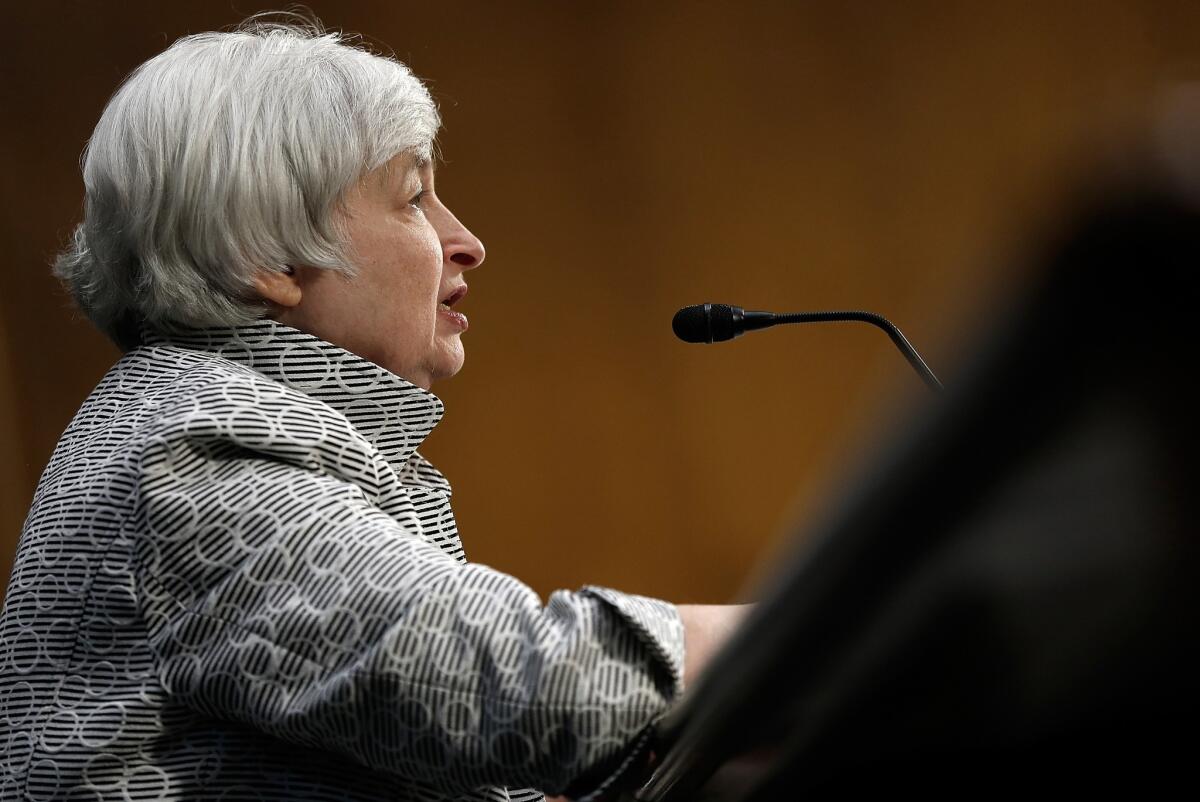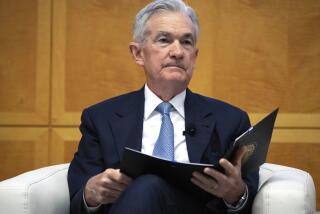Yellen says economy must improve more before Fed raises interest rates

- Share via
Reporting from Washington — Warning of past “false dawns” in the economic recovery, Federal Reserve Chairwoman Janet L. Yellen said Tuesday that central bank policymakers need to be cautious about raising rock-bottom interest rates.
Recent data indicate the economy has rebounded from a sharp slowdown in the first three months of the year, Yellen told senators. But the recovery “is not yet complete,” she warned.
“We have in the past seen false dawns … and later events have proven those hopes to be unfortunately over-optimistic,” Yellen said at a Senate Banking Committee hearing.
“We need to be careful to make sure the economy is on a solid trajectory before we consider raising interest rates,” she said.
The labor market continues to improve and inflation is beginning to rise toward the Fed’s 2% annual target after a long period of running well below that level, she said.
Despite an economic contraction in the first three months of the year, Yellen and other Fed officials expected “economic activity will expand at a moderate pace over the next several years.”
The sharp first-quarter slowdown “appears to have resulted mostly from transitory factors,” she said, echoing economists who largely attributed the contraction to severe weather in much of the country.
But recent economic indicators “suggest that growth rebounded in the second quarter.”
Still, Yellen said the economy’s progress “bears close watching.”
The housing market is one area of concern because it “has shown little recent progress.”
And while the Fed’s written monetary policy report to lawmakers Tuesday said there were no signs that the stock market was overvalued, it warned that stock values “appear substantially stretched” for “smaller firms in the social media and biotechnology industries.”
With continued worries about headwinds facing the economy, Yellen said Fed policymakers expect to keep easy-money policies in place for a while.
The economy added a robust 288,000 net new jobs in June and the unemployment rate fell to 6.1%, its lowest level since September 2008.
As the labor market improves — June was the fifth-straight month in which job growth exceeded 200,000 — pressure is building on the Fed to start raising its benchmark short-term interest rate.
Many Republicans want the Fed to start raising rates because they are particularly concerned that the low interest rates could fuel inflation.
The Fed has been reducing its monthly bond-buying stimulus program and Yellen said central bank policymakers planned to end the unprecedented effort in October.
Sen. Mike Johanns (R-Neb.) praised Yellen for the fast pace at which the Fed has been reducing its monthly purchases this year. But he said he was concerned about the Fed’s balance sheet, which the bond purchases have helped swell to nearly $4.4 trillion.
The Fed’s benchmark federal funds rate has remained near zero since late 2008 and policymakers have indicated they don’t plan to start raising it until mid 2015.
Yellen offered no hint that the Fed would start raising interest rates earlier. But she said she and other members of the policymaking Federal Open Market Committee would be monitoring economic progress closely.
“There’s no formula and there’s no mechanical answer I can give you about when the first rate increase will occur,” Yellen told Sen. Michael D. Crapo (R-Idaho). “It will depend on the progress of the economy and how we assess it based on a variety of indicators.”
Sen. Sherrod Brown (D-Ohio) asked Yellen about comments last week by new Fed Vice Chair Stanley Fischer that “actively breaking up the largest banks would be a very complex task, with uncertain payoff.”
Brown and some other lawmakers have been pushing to reduce the size of so-called “too-big-to-fail” banks.
Yellen said the Fed was “completely committed to trying to deal with too big to fail.”
Fischer, a former vice chairman at banking giant Citigroup Inc., was right to warn that mega banks were not the only risk to the financial system, she said.
“He pointed out and I agree that we have to worry about more than the too-big-to-fail firms and we could have systemic risk if a large number of smaller institutions are hit for some reason,” Yellen said.
For breaking economic news, follow @JimPuzzanghera on Twitter
More to Read
Inside the business of entertainment
The Wide Shot brings you news, analysis and insights on everything from streaming wars to production — and what it all means for the future.
You may occasionally receive promotional content from the Los Angeles Times.











